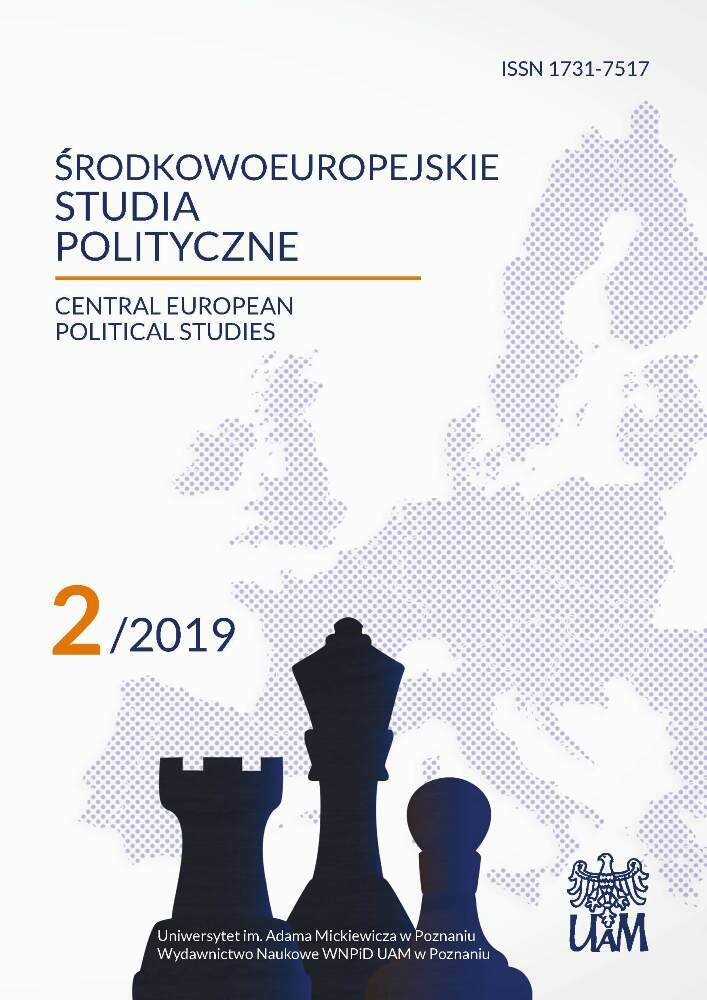Abstrakt
Zjawisko lobbingu, rozumiane jako wszystkie działania wykonywane przez bądź w imieniu grup interesu, ukierunkowane na oddziaływanie na proces podejmowania i implementowania decyzji politycznych, występuje w każdym reżimie politycznym. W niniejszym artykule zbadano czy nieliberalny model demokracji funkcjonujący na Węgrzech (2010–2014) wywierał wpływ na poziom efektywności działań mających na celu kontrolowanie lobbingu. Nieliberalna demokracja różni się od swego liberalnego odpowiednika w pięciu obszarach: rządów prawa, kontroli działań rządu i parlamentu przez niezależne od władz państwowych instytucje, poziomu korupcji wśród elit politycznych, stopnia wolności mediów oraz ochrony praw mniejszości. W artykule wykazano, że Węgry spełniały kryteria demokracji nieliberalnej dla każdego z obszarów w latach 2010–2014. Na podstawie przeprowadzonych badań stwierdzono, że nieliberalny model demokracji istniejący na Węgrzech zmniejszał efektywność kontroli działań lobbingowych w tym państwie.
Bibliografia
Ágh A., Dieringer J., Bönker F. (2015), 2015 Hungary Report, Bertelsmann Stiftung, Gütersloh.
Ágh A., Dieringer J., Bönker F. (2016), 2016 Hungary Report, Bertelsmann Stiftung, Gütersloh.
Alonso S., Keane J., Merkel W. (2011), Editors’ introduction: Rethinking the future of representative democracy, in: The Future of Representative Democracy, eds. S. Alonso, J. Keane, W. Merkel, Cambridge University Press, Cambridge. DOI: https://doi.org/10.1017/CBO9780511770883
Archives of the Hungarian National Assembly, http://www-archiv.parlament.hu/angol/append/legislative_act.htm, 01.09.2018.
Armstrong G., Kotler P. (2010), Principles of Marketing, Pearson Education, London.
Balogh E., The Hungarian Catholic Church and Education, http://hungarianspectrum.org/2016/04/01/the-hungarian-catholic-church-and-education/, 01.09.2018.
Bartha A. (2014), Lifting the Lid on Lobbying: National Report of Hungary, Transparency International Hungary, Budapest.
Bergan D. E. (2009), Does grassroots lobbying work? A field experiment measuring the effects of an e-mail lobbying campaign on legislative behaviour, “American politics research,” Vol. 37, no. 2. DOI: https://doi.org/10.1177/1532673X08326967
Dahl R. (2005), Demokracja i jej krytycy, Wydawnictwo Znak, Kraków.
Diamond L. (2002), Consolidating Democracies, in: Comparing Democracies 2: New Challenges in the Study of Elections and Voting, eds. L. LeDuc, R. Niemi, P. Norris, SAGE, London.
Dunham J., Nielson B., Aghekyan E. (2015), Freedom of the Press 2015. Harsh Laws and Violence Drive Global Decline, Freedom House, New York.
Freedom House (2010), Hungary. Freedom in the World 2010, https://freedomhouse.org/report/freedom-world/2010/hungary, 01.09.2018.
Freedom House (2011), Hungary. Freedom in the World 2011, https://freedomhouse.org/report/freedom-world/2011/hungary, 01.09.2018.
Freedom House (2014), Hungary. Freedom in the World 2014, https://freedomhouse.org/report/freedom-world/2014/hungary, 01.09.2018.
Freedom House (2016), Hungary. Freedom in the World 2016, https://freedomhouse.org/report/freedom-world/2016/hungary, 01.09.2018.
Grant W. (2003a), Lobbyists, in: Concise dictionary of Politics, eds. I. McLean, A. McMillan, Oxford University Press, Oxford.
Grant W. (2003b), Interest groups, in: Concise dictionary of Politics, eds. I. McLean, A. McMillan, Oxford University Press, Oxford.
Hegedüs D. (2016) Hungary 2016, Freedom House, New York, https://freedomhouse.org/sites/default/files/NIT2016_Hungary_0.pdf, 01.09.2018.
Karlekar K. (2010), Freedom of the Press 2010. Broad Setbacks to Global Media Freedom, Freedom House, New York.
Karlekar K. (2011), Freedom of the Press 2011. Signs of Change Amid Repression, Freedom House, New York.
Karlekar K., Dunham J. (2012), Freedom of the Press 2012. Breakthroughs and Pushback in the Middle East, Freedom House, New York.
Karlekar K., Dunham J., Freedom of the Press 2013. Middle East Volatility Amid Global Decline, Freedom House, New York.
Karlekar K., Dunham J. (2014), Freedom of the Press 2014. Media Freedom Hits Decade Low, Freedom House, New York.
Karolewski I., Benedikter R. (2017), Europe’s New Rogue States, Poland and Hungary: A Narrative and Its Perspectives, “Chinese Political Science Review,” no. 2. DOI: https://doi.org/10.1007/s41111-016-0048-5
Kovács B. (2013), Hungary 2013, in: Nations in Transit 2013: Democratization from Central Europe to Eurasia, ed. S. Habdank-Kolaczkowska, Rowman and Littlefield, New York.
Kovács B. (2014), Hungary 2014, in: Nations in Transit 2014: Democratization from Central Europe to Eurasia, eds. S. Habdank-Kolaczkowska, Z. Csaky, Rowman and Littlefield, New York.
Kovács B. (2015), Hungary 2015, in: Nations in Transit 2015: Democracy on the Defensive in Europe and Eurasia, ed. S. Habdank-Kolaczkowska, Rowman and Littlefield, New York.
Magyar B. (2016), Post-Communist Mafia State: The Case of Hungary, Central European University Press, Budapest. DOI: https://doi.org/10.1515/9786155513558
Merkel W. (2004), Embedded and Defective Democracies, “Democratization,” vol. 11, no. 5. DOI: https://doi.org/10.1080/13510340412331304598
Milbrath L. W. (1968), Lobbying, in: International Encyclopedia of the Social Sciences, vol. 9, ed. D. L. Sills, Macmillan Company & the Free Press, United States of America.
Molnár V., Hungary Expands List of Recognized Churches, http://www.paprikapolitik.com/2012/03/hungary-expands-list-of-recognized-churches/, 01.09.2018.
Parvin P. (2007). Friend or foe? Lobbying in British democracy, Hansard Society, London.
Sánchez-Cuenca I. (2003), Power, Rules, and Compliance, in: Democracy and the Rule of Law, eds. J. A. Maravall, A. Przeworski, Cambridge University Press, Cambridge. DOI: https://doi.org/10.1017/CBO9780511610066.003
Schmitter P. C. (2011), Diagnosis and designing democracy in Europe, in: The Future of Representative Democracy, eds. S. Alonso, J. Keane, W. Merkel, Cambridge University Press, Cambridge.
The World Justice Project (2013), Rule of Law Index 2012–2013, The World Justice Project, Washington DC.
The World Justice Project (2014), Rule of Law Index 2014, The World Justice Project, Washington DC.
Thomas C. S. (2004), Interests and Interest Groups in the Public Policy Process: (I) Strategies and Tactics, in: Research Guide to U.S. and International Interest Groups, ed. C. Thomas, Praeger, Westport.
Licencja
Prawa autorskie (c) 2019 Maciej Olejnik

Utwór dostępny jest na licencji Creative Commons Uznanie autorstwa 4.0 Międzynarodowe.

